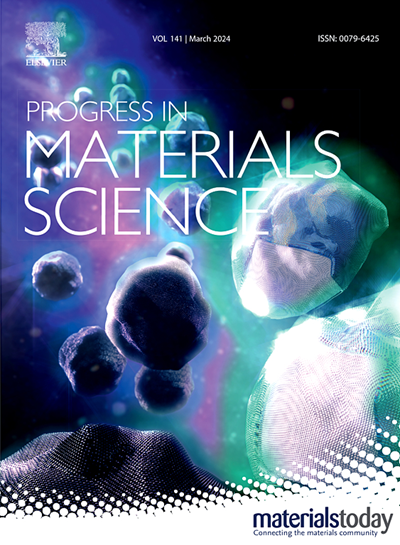水金属电池用聚合物凝胶
IF 33.6
1区 材料科学
Q1 MATERIALS SCIENCE, MULTIDISCIPLINARY
引用次数: 0
摘要
金属水电池具有能量密度高、成本低等优点,作为一种能量转换和存储装置受到了广泛的关注。聚合物凝胶具有较高的化学稳定性、安全性和对金属枝晶的抑制作用,是一种合适的电解质。然而,聚合物凝胶的商业应用受到包括电解质-电极界面、外力和极端环境在内的因素的挑战。此外,由于不同性能之间的权衡,设计满足多种需求的聚合物凝胶具有挑战性。本文综述了用于金属水电池的聚合物凝胶的最新研究进展。首先,综述了聚合物凝胶作为电解质的优点。然后,详细讨论了聚合物凝胶的结构、性能和应用之间的关系,以激励高性能聚合物凝胶的开发。总结了不同金属电池对聚合物凝胶的特殊要求,包括阻燃性、阳极保护、寄生产物分解等。随后,重点介绍了基于机器学习和表征技术的聚合物凝胶合成策略。最后,讨论了聚合物凝胶在水储能装置中的应用所面临的挑战和未来的前景。本文综述旨在为先进的相容性聚合物凝胶的设计提供指导。本文章由计算机程序翻译,如有差异,请以英文原文为准。
Polymer gels for aqueous metal batteries
With the advantages of high energy density and low cost, aqueous metal batteries have received widespread attention as energy conversion and storage devices. Polymer gels are suitable electrolytes because of their high chemical stability, safety, and inhibition of metal dendrites. However, the commercial application of polymer gels is challenged by factors that include electrolyte–electrode interfaces, external forces, and extreme environments. In addition, it is challenging to design polymer gels that satisfy multiple needs due to trade-offs between different properties. In this review, we present recent advances in polymer gels for aqueous metal batteries. First, the advantages of polymer gels as electrolytes are summarized. Then, the relationship among the structural, properties, and applications of polymer gels is discussed in detail to motivate the exploitation of high-performance polymer gels. The special requirements of different metal batteries for polymer gels are also summarized, including flame retardancy, anode protection, and decomposition of parasitic products. Subsequently, synthesis strategies based on machine learning and characterization techniques for polymer gels are highlighted. Finally, the challenges and future prospects of polymer gels for applications in aqueous electrical energy storage devices are discussed. This review aims to provide guidance for the design of advanced and compatible polymer gels.
求助全文
通过发布文献求助,成功后即可免费获取论文全文。
去求助
来源期刊

Progress in Materials Science
工程技术-材料科学:综合
CiteScore
59.60
自引率
0.80%
发文量
101
审稿时长
11.4 months
期刊介绍:
Progress in Materials Science is a journal that publishes authoritative and critical reviews of recent advances in the science of materials. The focus of the journal is on the fundamental aspects of materials science, particularly those concerning microstructure and nanostructure and their relationship to properties. Emphasis is also placed on the thermodynamics, kinetics, mechanisms, and modeling of processes within materials, as well as the understanding of material properties in engineering and other applications.
The journal welcomes reviews from authors who are active leaders in the field of materials science and have a strong scientific track record. Materials of interest include metallic, ceramic, polymeric, biological, medical, and composite materials in all forms.
Manuscripts submitted to Progress in Materials Science are generally longer than those found in other research journals. While the focus is on invited reviews, interested authors may submit a proposal for consideration. Non-invited manuscripts are required to be preceded by the submission of a proposal. Authors publishing in Progress in Materials Science have the option to publish their research via subscription or open access. Open access publication requires the author or research funder to meet a publication fee (APC).
Abstracting and indexing services for Progress in Materials Science include Current Contents, Science Citation Index Expanded, Materials Science Citation Index, Chemical Abstracts, Engineering Index, INSPEC, and Scopus.
 求助内容:
求助内容: 应助结果提醒方式:
应助结果提醒方式:


